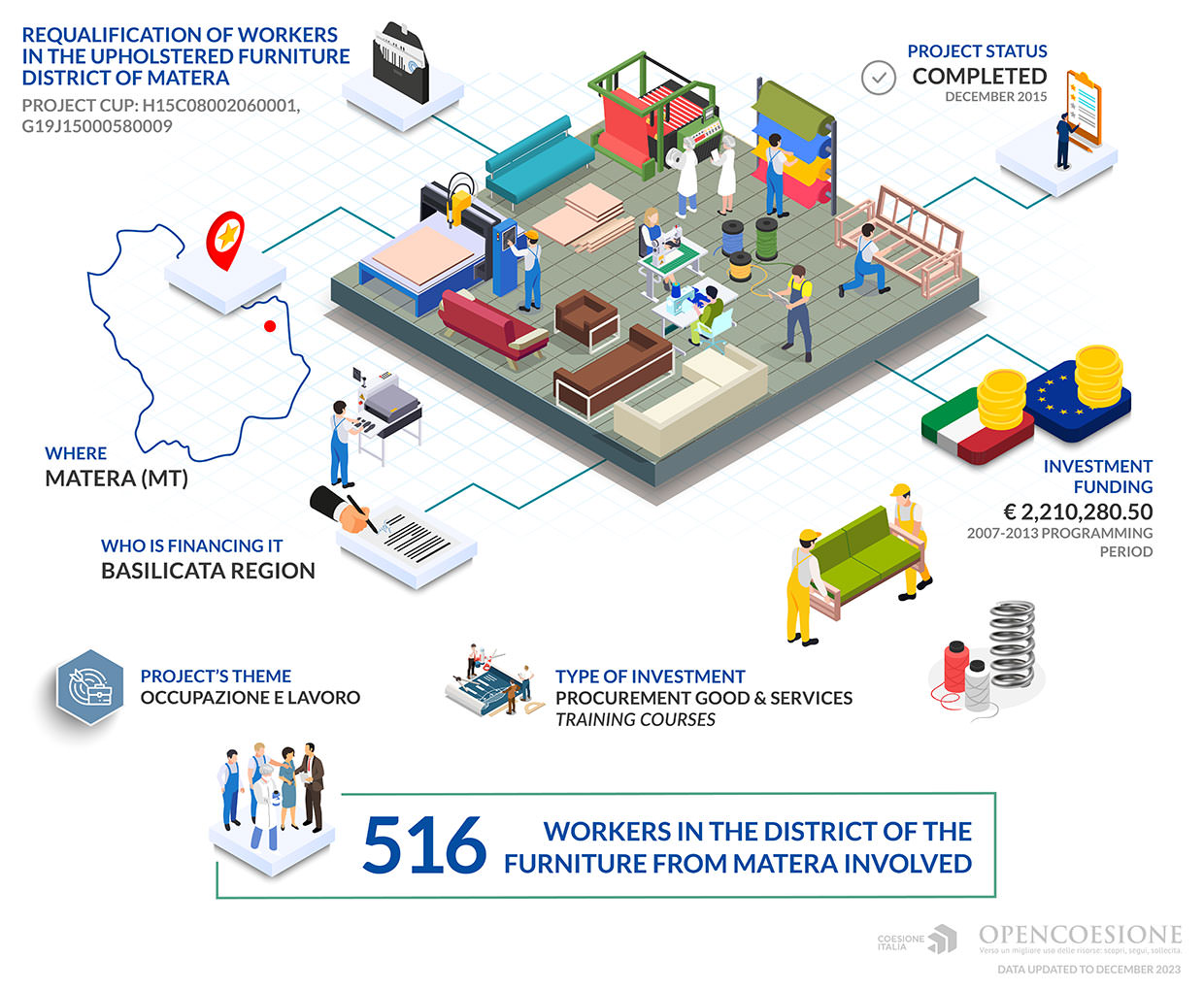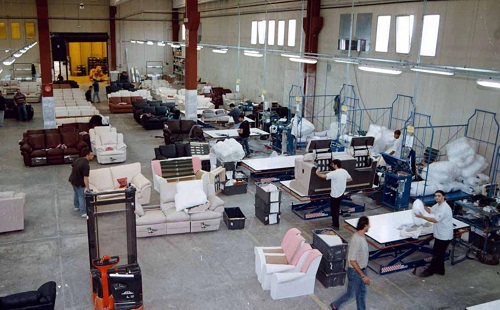The requalification of workers in the upholstered furniture district of Matera
The project in brief

The story of the project
Matera, the UNESCO World Heritage Site known as the City of the Sassi, is renowned not just for its distinctive beauty but also for the excellence of its upholstered furniture district, known as “Salotto di Matera” (Matera’s Living Room). A thriving industrial sector with a century-old history, it has contributed to enhancing the made in Italy brand worldwide.

The origins of the district date back to the early 20th century when the production of sofas and armchairs was still a craft activity. Over time, thanks to the tenacity and ingenuity of Matera’s master craftsmen, the sector evolved and industrialized, giving rise to a genuine productive district. The production is distinguished by high quality, attention to detail, and the use of premium materials. Today, the district comprises over 100 companies employing approximately 2,000 workers. In addition to its economic value, the district of Matera plays a crucial social role as the sector’s companies are among the main sources of local employment, especially for the youth. In essence, the district serves as a key driver for the development of the region and the well-being of the community.
However, over the past few decades, exacerbated by global financial instabilities, the sector has faced a period of profound crisis, leading to the closure of hundreds of companies and the subsequent loss of thousands of jobs (at its peak in the early 2000s, the Matera’s living room district employed around 7,000 workers during its heyday of productive success).
To address this situation, cohesion policies have intervened by initiating various professional redevelopment projects with the aim of assisting unemployed workers in reintegrating into the job market.
The project for the training and reintegration of upholstery workers in the province of Matera - promoted by the Province of Matera as part of the Regional Operational Program of the European Social Fund 2007-2013, with funding totaling 1,611,000 euros - was carried out by the consortium of training agencies I.S.F.I.Ma in collaboration with the Provincial Agency for Education and Vocational Training, Guidance, and Employment (AGEFORMA). From 2008 to 2013, the project involved 266 workers on layoff or mobility, providing them with personalized training programs and orientation services. Subsequently, starting in 2015, another 250 unemployed individuals were engaged in a similar project, financed again with ESF funds for an amount of approximately 600,000 euros, with additional resources from the Basilicata Region.
The training programs covered a wide range of topics, including: techniques for upholstered furniture production (cutting and sewing of coverings, assembly of structures, use of machinery and tools), design (sofa and armchair design, material and color selection, market trends), marketing (product promotion and sales, corporate communication, e-commerce), business management (strategic planning, management control, corporate finance), foreign languages, digitalization (use of software for design and production, digital marketing, e-commerce), Green Economy (environmental sustainability in upholstered furniture production, use of eco-friendly materials), tourism (tourist hospitality, territory promotion, enhancement of artisanal heritage). The project also provided participants with internships at companies in various sectors, allowing workers to apply the acquired skills, and job placement services to assist workers in finding new employment opportunities.

The interventions, specifically aimed at increasing the employability of workers in the “Salotto di Matera”, have been successful: thanks to a personalized and modular approach to training, approximately 70 percent of the participants have found new employment in various sectors, including construction, furnishings and design, tourism. Furthermore, they have gained new skills and knowledge that are valuable in the job market. These active labor policy measures have also served as an example of virtuous collaboration among local institutions, social partners, and companies, which have been able to benefit from a more qualified workforce.
Cohesion policies have significantly contributed to the preservation of the Matera district, which over time has been the subject of further initiatives by the Basilicata Region, particularly in the wake of Matera being the European Capital of Culture in 2019. Today, the district looks toward the challenges of the future with renewed confidence, also thanks to the recovery of the sector in the post-pandemic period.
With the support of all involved stakeholders and a continuous focus on innovation and professional development, the “Salotto di Matera” can continue to be a reference point for the upholstered furniture industry and a driving force for overall development in the Murgia territory.
